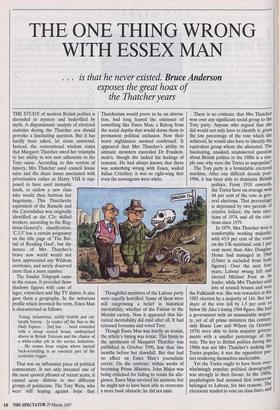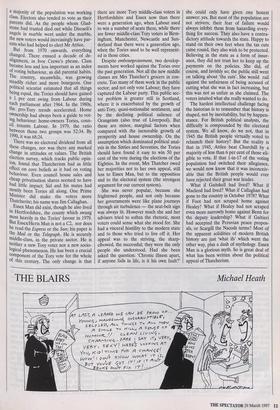THE ONE THING WRONG WITH ESSEX MAN
• is that he never existed. Bruce Anderson
exposes the great hoax of
the Thatcher years The Sunday Telegraph came to the rescue. It provided these shadowy figures with cans of lager, roftweilers and Sky TV dishes. It also gave them a geography. In the notorious profile which invented the term, Essex Man is characterised as follows: Young, industrious, mildly brutish and cul- turally barren.. .[a reader of] the Sun or the Daily &press. . . [he] has . been rewarded with a cheap council house, underpriced shares in British Telecom and the chance of a white-collar job in the service industries. . .. He comes from origins where mutual back-scratching is an essential part of the economic trigger.
That was an influential piece of political commentary. It not only invented one of the most quoted phrases of recent years; it caused acute distress to two different groups of politicians. The Tory Wets, who were still hoping against hope that Thatcherism would prove to be an aberra- tion, had long feared the existence of something like Essex Man; a Balrog from the social depths that would doom them to permanent political exclusion. Now their worst nightmares seemed confirmed. It appeared that Mrs Thatcher's ability to animate monsters exceeded Dr Franken- stein's, though she lacked his feelings of remorse. He had always known that there was something wrong with Essex, wailed Julian Critchley; it was so right-wing that even the newsagents were white.
Thoughtful members of the Labour party were equally horrified. Some of them were still outgrowing a belief in historical inevitability, whether of the Fabian or the Marxist variety. Now it appeared that his- torical inevitability did exist after all. It had tattooed forearms and voted Tory.
Though Essex Man was hardly an ironist, the article's timing was ironic. This hymn to the apotheosis of Margaret Thatcher was published in October 1990, less than two months before her downfall. But that had no effect on Essex Man's journalistic career. On the contrary: within weeks of becoming Prime Minister, John Major was being criticised for failing to retain his alle- giance. Essex Man survived his mistress, but he ought not to have been able to overcome a more basic obstacle: he did not exist. There is no evidence that Mrs Thatcher won over any significant social group to the Tory party. Anyone who argued that she did would not only have to identify it; given the low percentage of the vote which she achieved, he would also have to identify the equivalent group whom she alienated. The fascinating, unasked, unanswered question about British politics in the 1980s is a sim- ple one: why were the Tories so unpopular? The Tory party is a formidable electoral machine. After one difficult decade post 1906, it has been able to dominate British politics. From 1918 onwards, the Tories have on average won 44 per cent of the vote at gen- eral elections. That percentage is depressed by two periods of relative failure; the twin elec- tions of 1974, and all the elec- tions since 1979.
In 1979, Mrs Thatcher won a comfortable working majority, with 43.9 per cent of the votes on the UK mainland, only 1 per cent more than Alec Douglas Home had managed in 1964 (Ulster is excluded from both figures). Over the next four years, Labour swung left and elected Michael Foot as ds leader, while Mrs Thatcher sold lots of council houses and won the Falklands war. She was rewarded at the 1983 election by a majority of 144. But her share of the vote fell by 1.5 per cent to below Sir Alec's losing 1964 figure. She had a government with an unassailable majori- ty, yet of all prime ministers this century, only Bonar Law and Wilson (in October 1974) were able to form majority govern- ments with a smaller percentage of the vote. The key to British politics during the 1980s was not Mrs Thatcher's making the Tories popular; it was the opposition pas- ties rendering themselves unelectable.
Yet the Tories ought to have been over- whelmingly popular; political demographY was strongly in their favour. In the 1960s, psephologists had assumed that tomorrow belonged to Labour, for two reasons. The electorate tended to vote on class lines, and a majority of the population was working class. Electors also tended to vote as their Parents did. As the people whom Glad- stone had trusted died out while Disraeli's angels in marble went under the marble, the new voters would increasingly have par- ents who had helped to elect Mr Attlee. But from 1970 onwards, everything changed. There ensued a decade of de- alignment, in Ivor Crewe's phrase. Class became less and less important as an index of voting behaviour, as did parental habits. The country, meanwhile, was growing steadily richer and more bourgeois. One Political scientist estimated that all things being equal, the Tories should have gained a 1 per cent swing from Labour during each parliament after 1964. In the 1980s, the pro-Tory trends accelerated. Home ownership had always been a guide to vot- ing behaviour: home-owners Tories, coun- cil tenants Labour. In 1979, the ratio between those two groups was 52:34. By 1990, it was 68:24.
There was no electoral dividend from all these changes, nor was there any marked change in attitudes or values. The British election survey, which tracks public opin- ion, found that Thatcherism had as little effect on core beliefs as it had on voting behaviour. Even council house sales and cheap privatisation shares seemed to have had little impact; Sid and his mates had mostly been Tories all along. One Prime Minister did make the voters more Thatcherite; his name was Jim Callaghan. Essex Man did exist, though he also lived ln Hertfordshire, the county which swung most heavily in the Tories' favour in 1979. But Essex/Herts Man is not a C2, nor does he read the Express or the Sun; his paper is the Mail or the Telegraph. He is securely nuddle-class, in the private sector. He is neither a new Tory voter nor a new socio- logical phenomenon. He has been a crucial component of the Tory vote for the whole of this century. The only change is that there are more Tory middle-class voters in Hertfordshire and Essex now than there were a generation ago, when Labour used to win a number of seats there, while there are fewer middle-class Tory voters in Birm- ingham, Manchester, Newcastle and Sun- derland than there were a generation ago, when the Tories used to be well represent- ed in those cities.
Despite embourgeoisement, two develop- ments have worked against the Tories over the past generation. Not all the new middle classes are Mrs Thatcher's grocers in con- crete. Too many of them work in the public sector; and not only vote Labour; they have captured the Labour party. This public sec- tor problem is greater still in Scotland, where it is exacerbated by the growth of anti-Tory, quasi-nationalist sentiment, and by the declining political salience of Orangeism (also true of Liverpool). But these are minor, marginal factors when compared with the inexorable growth of prosperity and house ownership. On the assumption which dominated political anal- ysis in the Sixties and Seventies, the Tories should have found it easy to win 50 per cent of the vote during the elections of the Eighties. In the event, Mrs Thatcher owed her majorities not to her own appeal, still less to Essex Man, but to the opposition and to the electoral system (the strongest argument for our current system).
She was never popular, because she frightened people, and not only because her governments were like plane journeys through air turbulence — the seat-belt sign was always lit. However much she and her advisers tried to soften the rhetoric, most voters could sense what she stood for. She had a visceral hostility to the modern state and to those who tried to live off it. Her appeal was to the striving, the sharp- elbowed, the successful; they were the only people she understood. Had she been asked the question: 'Chronic illness apart, if anyone fails in life, is it his own fault?' she could only have given one honest answer: yes. But most of the population are not strivers; their fear of failure would always inhibit them from hazarding every- thing for success. They also have a contra- dictory attitude towards the state. Happy to stand on their own feet when the tax cuts came round, they also wish to be protected. Believing in the state as a form of insur- ance, they did not trust her to keep up the payments on the policies. She did, of course, and lavishly so; the public still went on talking about 'the cuts'. She would rail against the unfairness of being accused of cutting what she was in fact increasing, but this was not as unfair as she claimed. The voters intuited what she really wanted to do.
The hardest intellectual challenge facing the historian is to remember that history is shaped, not by inevitability, but by happen- stance. For British political analysts, the difficulty is compounded by the electoral system. We all know, do we not, that in 1945 the British people virtually voted to relaunch their history? But the reality is that in 1945, Attlee beat Churchill by a majority of less than 6 per cent of those eli- gible to vote. If that 1-in-17 of the voting population had switched their allegiance, we would now know that it was inconceiv- able that the British people would ever have rejected their great war leader.
What if Gaitskell had lived? What if Macleod had lived? What if Callaghan had gone to the country in October 1978? What if Foot had not scraped home against Healey? What if Healey had not scraped even more narrowly home against Benn for the deputy leadership? What if Galtieri had accepted the Peruvian peace propos- als, or Scare11 the Nacods terms? Most of the apparent solidities of modern British history are just 'what ifs' which went the other way, plus a dash of mythology. Essex Man is a glorious myth. So is great deal of what has been written about the political appeal of Thatcherism.



































































 Previous page
Previous page